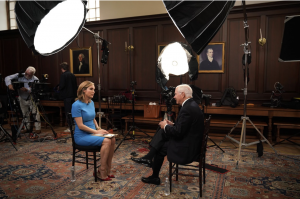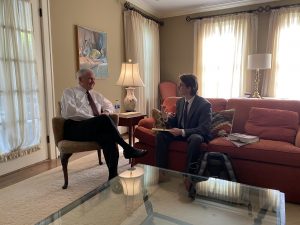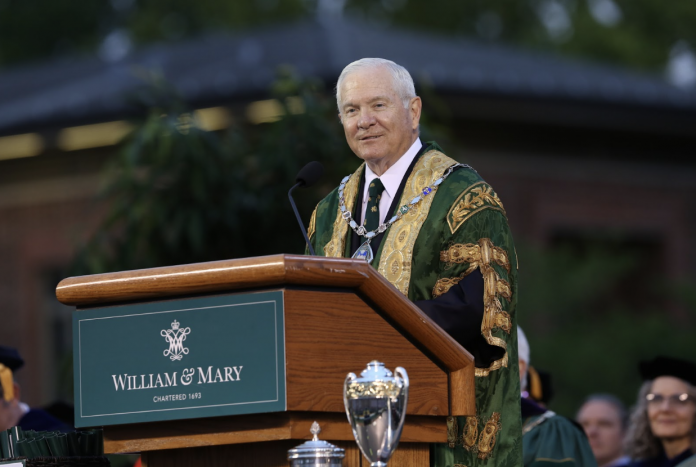Thursday, May 18, Chancellor Robert Gates ’65 sat down with The Flat Hat to reflect on his time at the College of William and Mary and provide advice to graduating students.
Gates, who served as the Director of Central Intelligence, the United States Secretary of Defense under two presidents, the President of Texas Agricultural and Mechanical University and the National President of the Boy Scouts of America, graduated from the College with a B.A. in history in 1965. He has served as Chancellor of the College since 2012.
“I started as a pre-med student,” Gates said. “I came in wanting to be a surgeon, actually, and a D-minus in freshman Calculus led me to begin rethinking that. I’d always liked reading biographies of American history, and of course being in Williamsburg had a big impact, so in my sophomore year, I changed my major to History.”
Gates began his undergraduate studies in 1961 and graduated in 1965. He discussed the evolving culture of the College since his time as a student.
“When I came to William and Mary, it was a very different era,” Gates said. “One of the things that is most vivid for me was my high school in Kansas had probably been about 25% African American. And when I came to William and Mary in 1961, there wasn’t a single Black student on campus. Virginia was completely segregated. And, you know, there was only one theater in town, and that was the one on Duke of Gloucester Street, and there was actually a section roped off for African-Americans. So that is a very vivid memory that has remained with me and a very positive change that’s taken place here on the campus.”
Gates also discussed the College’s comparatively quiet political environment.
“There was only one demonstration in my entire four years here on campus, and it was because the Country and Western show, a TV show called ‘Hootenanny,’ was going to perform on campus live, and the administration canceled it because it was during finals,” Gates said. “I think that’s the only demonstration the whole four years I was here. So the campus was very, I’d say, pretty apolitical, and just not very engaged compared to today.”
To escape some of the stresses of the College’s rigorous academics, Gates picked up a job working as a school bus driver for several years.
“I had a high school route and an elementary school route, and I particularly enjoyed the elementary route, it was a lot of fun,” Gates said.
He described how he mixed in his education and his bus driving job by giving the students lessons, telling the students about events that happened on that day 100 or 200 years ago and teaching them Russian and German phrases.

Gates also spoke about his leadership experiences in government, in higher education and in non-profit organizations.
“I loved each of the institutions I led, but I always believed each of them could be better than it already was,” Gates said. “And so I was always looking for how to make this place run better? How do we do this better? How do we make this place more responsive? How do we accomplish our mission better? So that really was the guiding mantra really of everything I ever did as a leader.”
While his role as Chancellor is less hands-on than some of his previous leadership positions, Gates still helps shape the future of the College. He described himself primarily as a “cheerleader” and as a counselor to the president of the College.
“The challenge for big institutions and particularly old institutions with very strong cultures is, ‘How do you preserve the traditions and the culture that has allowed an institution to thrive and survive for a very long period of time, but make the changes that are needed for it to prosper in the future?,’” Gates said. “So it’s this balance of how do you preserve what’s important while shedding the barnacles that have accumulated over the decades and over the centuries while moving forward.
He praised President Katherine Rowe’s Vision 2026 plan as providing positive change.
“I think particularly the programs that President Rowe has underway now and the vision plan and so on, I think all are pointing the College in the right direction,” Gates said. “It’s changing in a healthy way, and as best I can tell, preserving the traditions that really matter and the culture that really matters.”
Gates cited specific changes he supports, including the upcoming arts quarter and said he appreciates that the College has put a larger emphasis on science in recent decades while still maintaining its liberal arts core.
During his time at the College, Gates was inspired by President John F. Kennedy’s rousing speeches in support of public service, and he noted a lack of emphasis on such support today.
“Unfortunately, in my lifetime, there have only been two presidents that encouraged that publicly and repeatedly encouraged public service, one was John F. Kennedy and the other was George H.W. Bush, and that’s a source of regret for me,” Gates said. “More candidates for president than not run against the government they want to lead, rather than saying ‘we can take something that’s good and we can make it a lot better.’”
He cited what he saw as an under-appreciation for the civil service as a potential cause.
“Here’s something that nobody ever talks about: the United States of America probably has the most honest civil service at every level, municipal, state and national,” Gates said. “The most honest civil service in the world. Bar none. You don’t have to bribe people to get a license. You may have to take years, too long to get a license, but to build something or whatever. But you’re not having to pay off people. And it’s an honest civil service and nobody remarks on that kind of thing.”
Gates spoke to how recent and upcoming graduates of the College can navigate the potentially daunting career paths ahead of them. He counseled that graduates should not fear taking risks.
“My counsel would be: it’ll be okay,” Gates said. “I felt that same way when I was graduating. I was going to grad school, and when I got to the CIA, I was very annoyed. And, you know, this is typical of type-A young people. I was very annoyed the CIA didn’t have a career path for me, you know, where am I going to be in three years or four years? When am I going to get this promotion? What job do you see me getting after this one, and then after that one and everything? And looking back, I realize that would have been catastrophic for me because the counsel I would offer is that in the public sector and in the private sector, you’re going to have to take risks with your career. And sometimes things come along that may or may not seem like they’re an opportunity, but they are. But there’s a lot of risk associated with making that leap, and you have to be willing to take the leap.”
He described a moment when he was asked to join the staff of the National Security Council by Henry Kissinger and Brent Scowcraft in 1974. His bosses at the CIA told him that if he left, he likely would not have a job back at the CIA if he wanted to return. He took the risk, and ended up staying on the National Security Council staff for five years before returning to the CIA in 1979.
“I think that the sense of anxiety and uncertainty at 21 or 22 or 23 is completely understandable, but if you’re smart enough to graduate from William and Mary, things are going to turn out okay for you,” Gates said.


